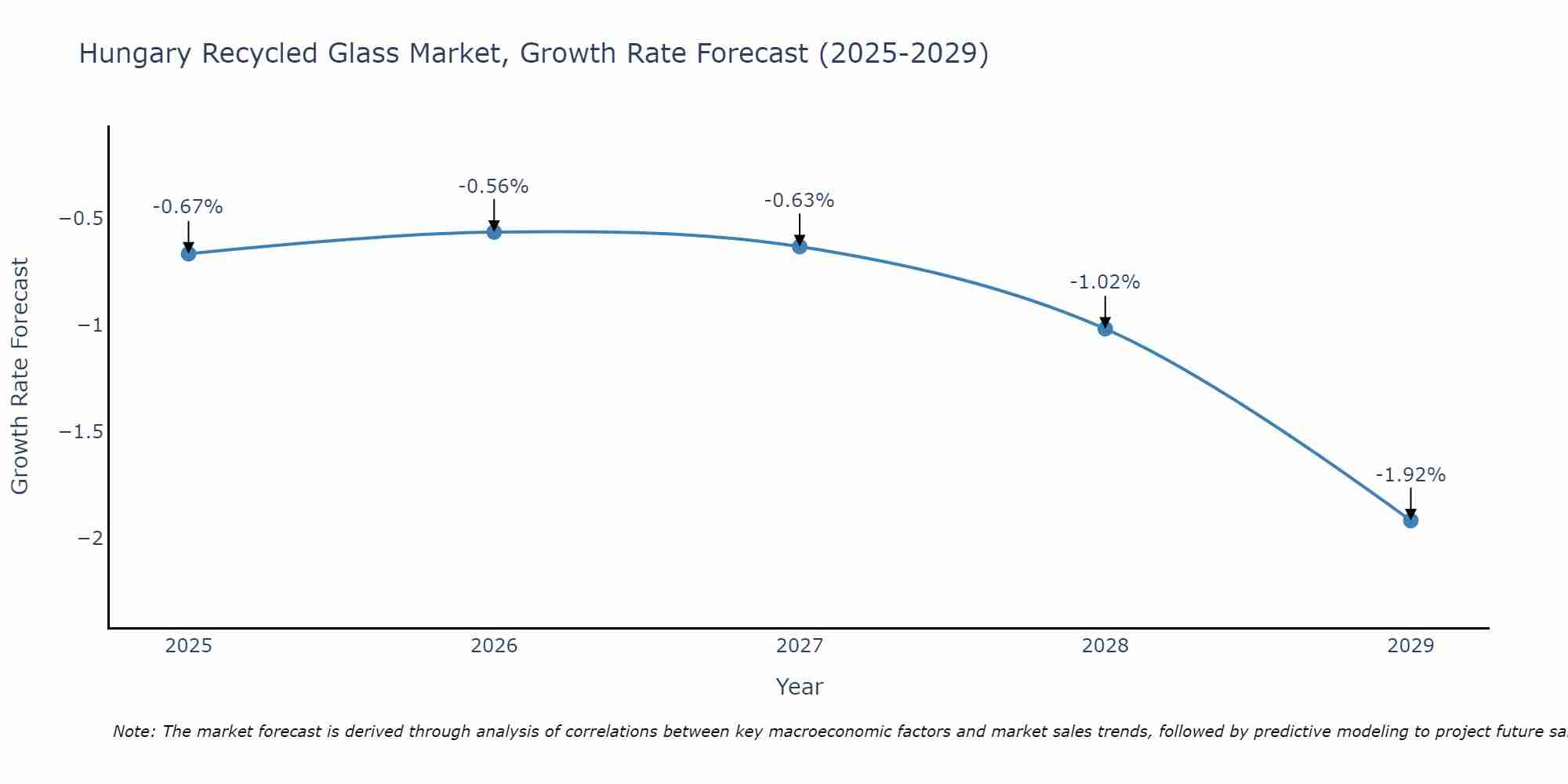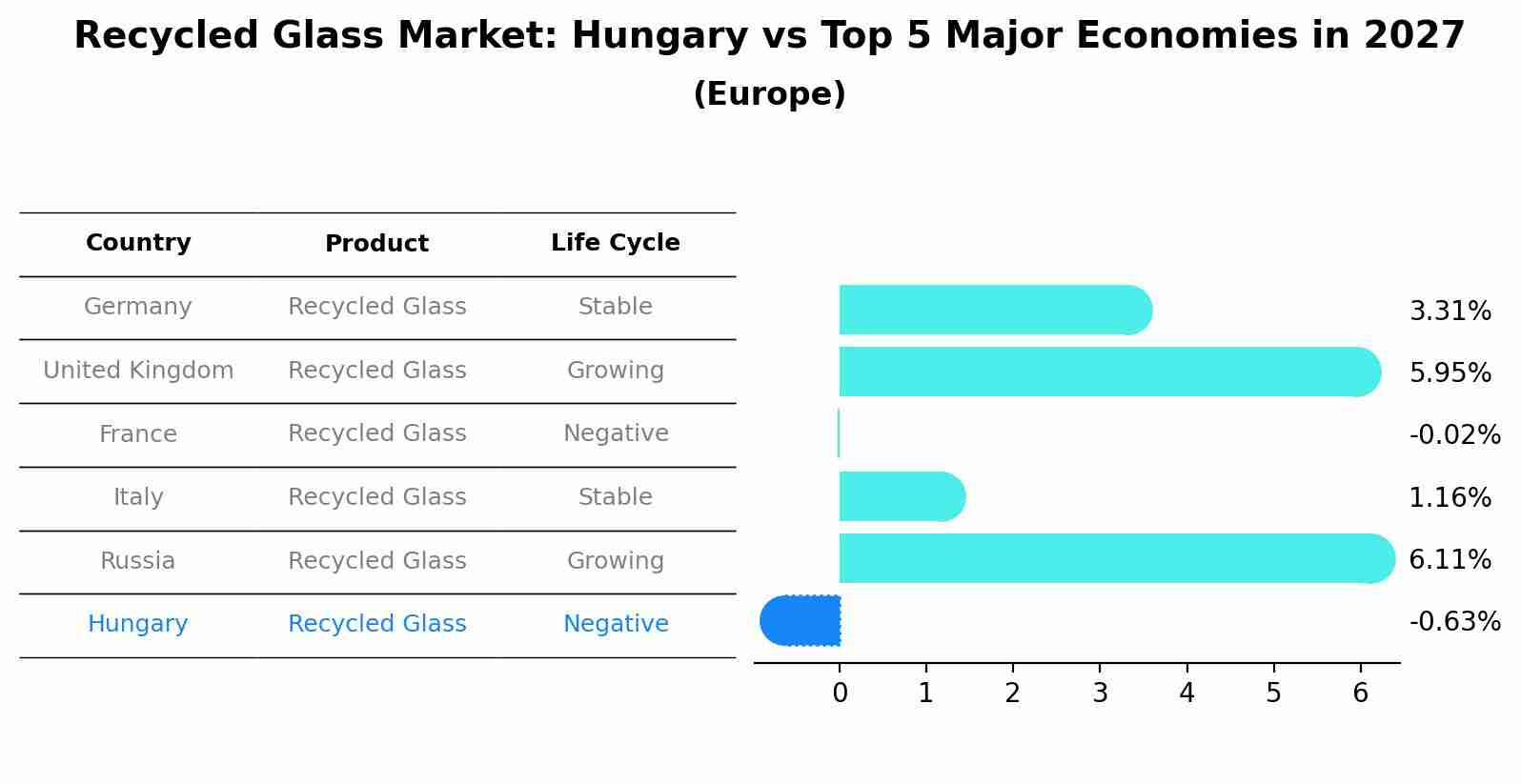Hungary Recycled Glass Market Outlook | Trends, Forecast, Revenue, Share, Growth, Value, COVID-19 IMPACT, Industry, Companies, Size & Analysis
| Product Code: ETC355699 | Publication Date: Aug 2022 | Updated Date: Aug 2025 | Product Type: Market Research Report | |
| Publisher: 6Wresearch | Author: Ravi Bhandari | No. of Pages: 75 | No. of Figures: 35 | No. of Tables: 20 |
Hungary Recycled Glass Market Size Growth Rate
The Hungary Recycled Glass Market is projected to witness mixed growth rate patterns during 2025 to 2029. The growth rate begins at -0.67% in 2025, climbs to a high of -0.56% in 2026, and moderates to -1.92% by 2029.

Recycled Glass Market: Hungary vs Top 5 Major Economies in 2027 (Europe)
Hungary's Recycled Glass market is anticipated to experience a negative growth rate of -0.63% by 2027, reflecting trends observed in the largest economy Germany, followed by United Kingdom, France, Italy and Russia.

Hungary Recycled Glass Market Synopsis
The Hungary recycled glass market is witnessing steady growth driven by increasing environmental awareness and government initiatives promoting sustainable practices. The market is primarily fueled by the demand for recycled glass in the production of containers, fiberglass insulation, and construction materials. Key players in the market are focusing on technological advancements to improve the efficiency of glass recycling processes and meet the growing demand for recycled glass products. Additionally, rising concerns over waste management and landfill usage are further boosting the adoption of recycled glass in various industries. The market is expected to continue its growth trajectory in the coming years as Hungary strives to achieve its sustainability goals and reduce its carbon footprint.
Hungary Recycled Glass Market Trends
The Hungary Recycled Glass Market is experiencing a surge in demand due to the growing awareness of environmental sustainability among consumers and government regulations promoting recycling efforts. Companies in the market are focusing on developing innovative solutions for collecting and processing recycled glass to meet the increasing demand from industries such as packaging, construction, and automotive. Collaborations between glass manufacturers and recycling facilities are becoming more common to ensure a steady supply of recycled glass. Additionally, there is a rising trend of incorporating recycled glass into new products and construction materials to reduce the environmental impact and promote a circular economy. Overall, the Hungary Recycled Glass Market is poised for growth as key players prioritize sustainability and eco-friendly practices in their operations.
Hungary Recycled Glass Market Challenges
In the Hungary Recycled Glass Market, significant challenges include limited collection infrastructure, inconsistent recycling practices, and lack of consumer awareness. The collection infrastructure for recycled glass in Hungary is not as well-developed compared to other European countries, leading to lower recycling rates. In addition, there is a lack of consistent recycling practices across different regions, making it difficult to streamline the recycling process. Furthermore, many consumers are not fully aware of the benefits of recycling glass and may not actively participate in recycling efforts. These challenges hinder the growth of the recycled glass market in Hungary and require increased education, investment in infrastructure, and public awareness campaigns to overcome.
Hungary Recycled Glass Market Investment Opportunities
The Hungary Recycled Glass Market offers various investment opportunities for both local and international investors. With increasing awareness and government initiatives focusing on sustainability and environmental protection, there is a growing demand for recycled glass products in Hungary. Potential investments could include establishing or expanding recycling facilities to process glass waste, investing in technology for improved recycling processes, and developing innovative recycled glass products for the construction, packaging, and automotive industries. Additionally, partnerships with local municipalities and businesses to collect and recycle glass waste efficiently could be a strategic investment opportunity. Overall, the Hungary Recycled Glass Market presents a promising sector for investors looking to capitalize on the growing trend towards sustainability and circular economy practices.
Jordan Agar Market Government Policies
The Hungarian government has implemented various policies to promote recycling in the glass market. These policies include the establishment of a deposit refund system for glass bottles, which incentivizes consumers to return their used glass containers for recycling. Additionally, there are regulations in place that require glass manufacturers to use a certain percentage of recycled glass in their production processes. The government also provides support for the development of recycling infrastructure and facilities to increase the collection and processing of recyclable glass materials. Overall, these policies aim to reduce waste, conserve resources, and promote a more sustainable approach to glass production and consumption in Hungary.
Hungary Recycled Glass Market Future Outlook
The Hungary recycled glass market is expected to experience steady growth in the coming years due to increasing awareness about environmental sustainability and government initiatives promoting recycling. The demand for recycled glass products is likely to rise as consumers and businesses prioritize eco-friendly materials. Additionally, the construction industry`s shift towards sustainable building practices will drive the demand for recycled glass in applications such as insulation, countertops, and landscaping. Technological advancements in glass recycling processes will also contribute to market growth by improving efficiency and reducing production costs. Overall, the Hungary recycled glass market is poised for expansion as the country continues to embrace a circular economy model and sustainable development practices.
Key Highlights of the Report:
- Hungary Recycled Glass Market Outlook
- Market Size of Hungary Recycled Glass Market, 2021
- Forecast of Hungary Recycled Glass Market, 2031
- Historical Data and Forecast of Hungary Recycled Glass Revenues & Volume for the Period 2018 - 2031
- Hungary Recycled Glass Market Trend Evolution
- Hungary Recycled Glass Market Drivers and Challenges
- Hungary Recycled Glass Price Trends
- Hungary Recycled Glass Porter's Five Forces
- Hungary Recycled Glass Industry Life Cycle
- Historical Data and Forecast of Hungary Recycled Glass Market Revenues & Volume By Product for the Period 2018 - 2031
- Historical Data and Forecast of Hungary Recycled Glass Market Revenues & Volume By Crushed Glass for the Period 2018 - 2031
- Historical Data and Forecast of Hungary Recycled Glass Market Revenues & Volume By Cullets for the Period 2018 - 2031
- Historical Data and Forecast of Hungary Recycled Glass Market Revenues & Volume By Glass Powder for the Period 2018 - 2031
- Historical Data and Forecast of Hungary Recycled Glass Market Revenues & Volume By Application for the Period 2018 - 2031
- Historical Data and Forecast of Hungary Recycled Glass Market Revenues & Volume By Glass Bottle & Containers for the Period 2018 - 2031
- Historical Data and Forecast of Hungary Recycled Glass Market Revenues & Volume By Flat Glass for the Period 2018 - 2031
- Historical Data and Forecast of Hungary Recycled Glass Market Revenues & Volume By Fiber Glass for the Period 2018 - 2031
- Historical Data and Forecast of Hungary Recycled Glass Market Revenues & Volume By Highway Beads for the Period 2018 - 2031
- Historical Data and Forecast of Hungary Recycled Glass Market Revenues & Volume By Abrasives for the Period 2018 - 2031
- Historical Data and Forecast of Hungary Recycled Glass Market Revenues & Volume By Fillers for the Period 2018 - 2031
- Historical Data and Forecast of Hungary Recycled Glass Market Revenues & Volume By Others for the Period 2018 - 2031
- Hungary Recycled Glass Import Export Trade Statistics
- Market Opportunity Assessment By Product
- Market Opportunity Assessment By Application
- Hungary Recycled Glass Top Companies Market Share
- Hungary Recycled Glass Competitive Benchmarking By Technical and Operational Parameters
- Hungary Recycled Glass Company Profiles
- Hungary Recycled Glass Key Strategic Recommendations
Frequently Asked Questions About the Market Study (FAQs):
- Single User License$ 1,995
- Department License$ 2,400
- Site License$ 3,120
- Global License$ 3,795
Search
Thought Leadership and Analyst Meet
Our Clients
Related Reports
- Canada Oil and Gas Market (2026-2032) | Share, Segmentation, Value, Industry, Trends, Forecast, Analysis, Size & Revenue, Growth, Competitive Landscape, Outlook, Companies
- Germany Breakfast Food Market (2026-2032) | Industry, Share, Growth, Size, Companies, Value, Analysis, Revenue, Trends, Forecast & Outlook
- Australia Briquette Market (2025-2031) | Growth, Size, Revenue, Forecast, Analysis, Trends, Value, Share, Industry & Companies
- Vietnam System Integrator Market (2025-2031) | Size, Companies, Analysis, Industry, Value, Forecast, Growth, Trends, Revenue & Share
- ASEAN and Thailand Brain Health Supplements Market (2025-2031) | Strategy, Consumer Insights, Analysis, Investment Trends, Opportunities, Growth, Size, Share, Industry, Revenue, Segments, Value, Segmentation, Supply, Forecast, Restraints, Outlook, Competition, Drivers, Trends, Demand, Pricing Analysis, Competitive, Strategic Insights, Companies, Challenges
- ASEAN Bearings Market (2025-2031) | Strategy, Consumer Insights, Analysis, Investment Trends, Opportunities, Growth, Size, Share, Industry, Revenue, Segments, Value, Segmentation, Supply, Forecast, Restraints, Outlook, Competition, Drivers, Trends, Demand, Pricing Analysis, Competitive, Strategic Insights, Companies, Challenges
- Europe Flooring Market (2025-2031) | Outlook, Share, Industry, Trends, Forecast, Companies, Revenue, Size, Analysis, Growth & Value
- Saudi Arabia Manlift Market (2025-2031) | Outlook, Size, Growth, Trends, Companies, Industry, Revenue, Value, Share, Forecast & Analysis
- Uganda Excavator, Crane, and Wheel Loaders Market (2025-2031) | Strategy, Consumer Insights, Analysis, Investment Trends, Opportunities, Growth, Size, Share, Industry, Revenue, Segments, Value, Segmentation, Supply, Forecast, Restraints, Outlook, Competition, Drivers, Trends, Demand, Pricing Analysis, Competitive, Strategic Insights, Companies, Challenges
- Rwanda Excavator, Crane, and Wheel Loaders Market (2025-2031) | Strategy, Consumer Insights, Analysis, Investment Trends, Opportunities, Growth, Size, Share, Industry, Revenue, Segments, Value, Segmentation, Supply, Forecast, Restraints, Outlook, Competition, Drivers, Trends, Demand, Pricing Analysis, Competitive, Strategic Insights, Companies, Challenges
Industry Events and Analyst Meet
Whitepaper
- Middle East & Africa Commercial Security Market Click here to view more.
- Middle East & Africa Fire Safety Systems & Equipment Market Click here to view more.
- GCC Drone Market Click here to view more.
- Middle East Lighting Fixture Market Click here to view more.
- GCC Physical & Perimeter Security Market Click here to view more.
6WResearch In News
- Doha a strategic location for EV manufacturing hub: IPA Qatar
- Demand for luxury TVs surging in the GCC, says Samsung
- Empowering Growth: The Thriving Journey of Bangladesh’s Cable Industry
- Demand for luxury TVs surging in the GCC, says Samsung
- Video call with a traditional healer? Once unthinkable, it’s now common in South Africa
- Intelligent Buildings To Smooth GCC’s Path To Net Zero


















